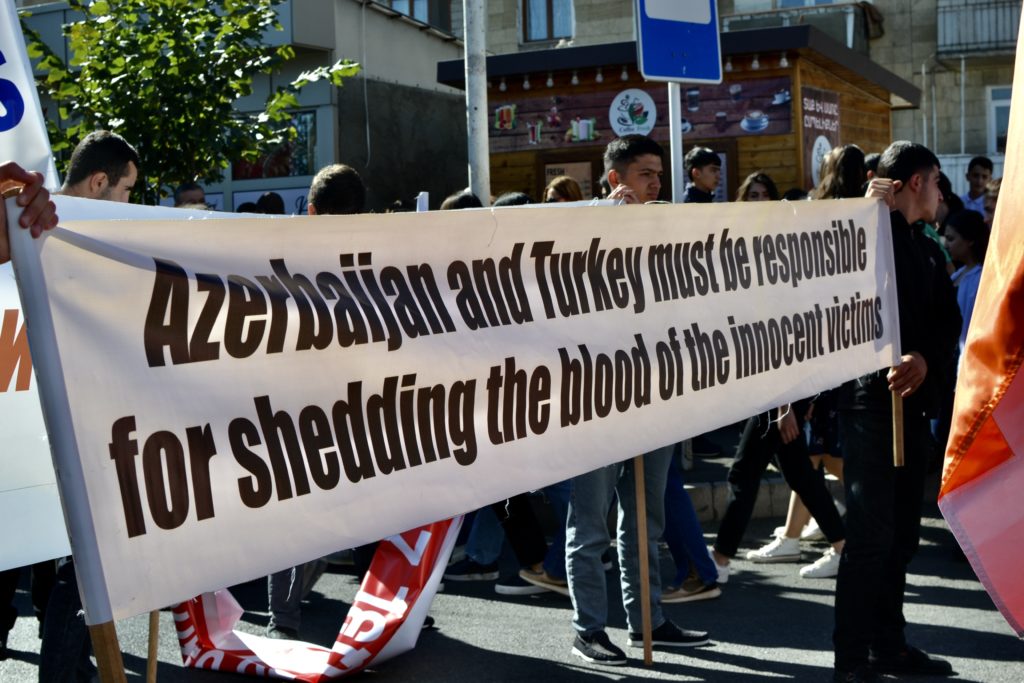by Stepan Piligian
Every nation protects its sovereignty through the value of self-interest. The intersection of a nation’s self-interest creates alliances such as NATO, the European Union (EU) and state to state agreements. The misalignment of self-interests leads to conflicts such as the Iraq war, Syria and now in the Ukraine. Armenia has experienced this lack of commonality with aggressive neighbors for centuries. The latest version of this historic dilemma is the Turkic alliance of Turkey and Azerbaijan. The United Nations (UN) was founded based on the respect of sovereignty of each nation, and billions of dollars are spent each year to enforce and mediate these principles. As we have painfully witnessed in our lifetime, the UN, international courts and the European courts are subject to political bias or gridlock and lack any effective enforcement mechanism when judgements are made. The well-documented war crimes of Azerbaijan in the 2020 war are a clear example of the existing anarchy that enables nations to commit criminal acts against another. Recognizing an act or articulating displeasure are common, but realizing justice is entirely a different story. Large nations serve their self-interests to essentially protect their power and influence on the world stage.
The foreign policies of the United States and France, for example, are based on what best serves the interests of those nations. Smaller nations, such as Armenia, simply operate to survive and avoid being collateral damage from the interplay of larger conflicts. There are times when the interests of the smaller nations may align with larger nations, and the smaller nations become the beneficiary of the windfall. This is where Armenia is today: searching for a reliable partner while working vigorously to avoid the damage of larger geopolitical forces. Prosperous and sustainable smaller nations have succeeded in finding that balance and securing those relationships. In the case of Armenia, it will not be because of national resources or political power, but perhaps through geographic position as a functioning democracy. For decades, Armenia has operated as a de facto vassal state of Russia, protected from extinction but prevented from prosperity. The latest round of CSTO intransigence is further evidence that maintaining control in the region is Russia’s priority and that it is not always aligned with Armenia’s self-interest. The Eurasia region has recently become a larger variable in the self-interest equation of the United States, Europe and perhaps India.
Read also
This is an opportunity for Armenia, but the path is fraught with danger and uncertainty. Still, it must be viewed in the context of finding common ground for survival. All nations, large or small, powerful or challenged, share the driving force of self-interest, but for Armenia it has become a matter of survival. The nations in the EU, the Western Hemisphere and Russia are driven by protecting their positions of influence. The comparison with Armenia ends there as our homeland struggles for its survival surrounded by wolves seeking their destruction. The recent assertive behavior of the US and France is a welcome change from the robotic statements after the 2020 war urging both parties to end the violence. This behavior has continued to embolden the criminal acts of Azerbaijan.
The US State Department has been unusually succinct in its post-September 13 public statements on the Azeris pulling back their troops to their territory and vacating the positions on Armenian territory. France and other European nations have been equally bold in their positions on territorial incursions and war crimes. Just this week, 17 Armenian POWs were released with US mediation. It is important for the US and Europeans not to view the Azeris as benevolent and cooperative after the illegal and abusive hold of Armenian prisoners. The Turks are infamous for committing illegal acts of aggression in Iraq, Syria and the Aegean, only to be confronted, consolidating their efforts and creating the perception that they are willing partners. With our obsession with short-term thinking, many in the West have actually thanked the Turks for backing down and consolidating their net gains. A thief is never a hero or reliable. The strategically challenged Azeris are operating with the same approach. They break international law and the sovereign rights of others, but they still illegally occupy land. Their withdrawal from land occupied illegally has been viewed by some as a positive contribution. Since when do we thank criminals without implication?
The matter of the “Zangezur Corridor” has advanced slightly in Armenia’s favor recently. Russia’s Foreign Ministry, which is working to maintain some semblance of balance to support their goal of control, announced that there was no discussion or agreement on an extra territorial corridor through sovereign Armenian land during the trilateral talks in 2020. They basically agreed with Armenia’s view that opening transportation links consistent with international sovereign laws and customs agreements was the objective. Iran has continuously repeated its position that any change in the common border with Armenia was “unacceptable.”
Azerbaijan’s warped vision of the corridor would transform the lower portion of Syunik into an island surrounded by Azerbaijanis on three sides. Armenia had essentially stood alone in opposing this illegal demand, but it is somewhat heartening to know that Iran, Russia and the West seem to share a common view of this controversy. Given the self-interest motivation, we know that they may agree for vastly different reasons. If it holds true, Armenia should take advantage of this unique arrangement. Survival with security is the current objective. The anger and disappointment over the failure of the CSTO to honor its defense agreement with Armenia have enabled discussions in Armenia about exiting the treaty. There is no question that Armenia has serious questions about its relationship with Russia. There is no doubt that Russia has supported Armenia in many dimensions, but the crisis with Armenia’s security has raised new concerns. Russia’s self-interest is to maintain its sphere of influence in the South Caucasus. The implementation of that objective is not always aligned with the needs of Armenia. A lack of support does not mean that exiting is in Armenia’s interest.
What is the alternative? We should recall the 2008 crisis in Georgia, which has been a NATO nation-in-waiting for many years. The strain in their relationship with Russia led to threats of invasion to the Georgian territory of South Ossetia and Abkhazia. The US administration offered support to Georgia. Russia invaded and absorbed the two areas after routing the Georgians. It was a Ukraine scenario long before the 2022 war began. The West may have good intentions, but unless they commit defensive capabilities, they should remember that Russia lives in the neighborhood. The CSTO may do little for Armenia, but until a solid alternative is developed, exiting is not practical. Leaving the CSTO would create an overt adversarial relationship with an unpredictable Russia. Who will be the guarantor of Armenia’s security as Russia claims in their strategic relationship? What about the Russian bases and their long-term agreements if they exit the CSTO? It’s complicated at a minimum. Is Iran an option given the historic relationship, common border and the Iranian Azeri problem? Will the West continue to advance its interest in the South Caucasus or retreat into periodic isolationism?
It is gratifying to see Armenia take a more assertive public position on the Azeri demands. Certainly, the recent supportive roles from France, the United States, Iran and the EU give Armenia more leverage. It is difficult to be on the offensive when you are alone. I have long believed (and prayed for) that bully criminal nations like Turkey and Azerbaijan will one day wear out their welcome and make a strategic blunder. We are still waiting, but it seems that the credibility of Turkey and Azerbaijan are at their lowest levels in years. Armenia has the challenge of navigating the crowded geopolitical waters and finding combinations that align with its self-interest. There is no question that Armenia’s diplomatic corps and security apparatus are working overtime with consultations in Moscow, Washington, Paris and Brussels. We don’t know if these private discussions match the public rhetoric and whether the western advances will lead to economic and military sanctions, but those cards are on the table.
This is a time to focus on those enemies of Armenia whose thinly veiled attempts are intended to destroy the Republic. Defending Armenia economically, militarily and diplomatically should be enough to unite any nation fighting for its survival. Sometimes, it seems that our very existence is not enough to bring us together. Perhaps it’s because we have been in what seems a constant state of crisis that it doesn’t seem as serious. This is a time to occupy our time with the work of Armenia’s self-interest. That may include advocating for the US to cut all aid to Azerbaijan, investing in the homeland and taking on countless other initiatives that will bring us together and make an impact. We must learn from the past, but we must always live in the present in order to secure our future.
We are dealing with a barbaric enemy, the likes of which we have not seen since the Young Turks committed genocide. With the rape and mutilation of Armenians and the horrific murder of Armenian soldiers, we are dealing with the impact of long-term racist behavior that has entered policy. The so-called corridor is a veneer for a desire to carve up our homeland and create another wasteland as they did in Nakhichevan and are currently doing in Hadrut. Armenia should take a page from the Turkish playbook. Worry less about long-term loyalty, and make decisions based on self-interest between the east and west. In politics, everyone uses each other for their own interests. Armenia has that opportunity with the west’s renewed interest. Dangerous? Yes. Complicated? Certainly, but with survival at stake the risk seems acceptable.

























































